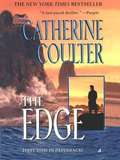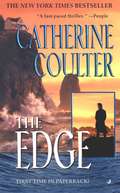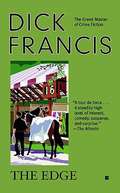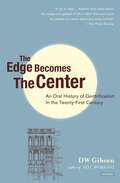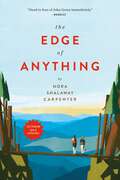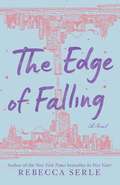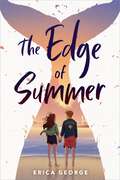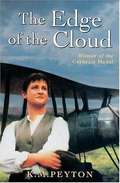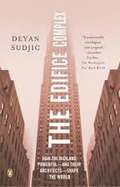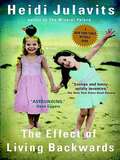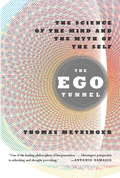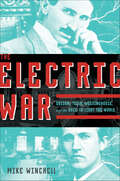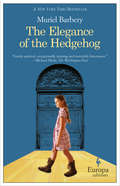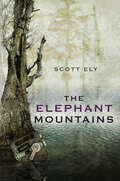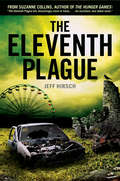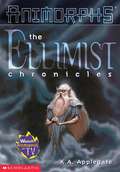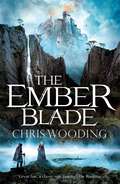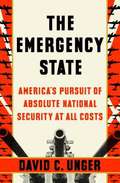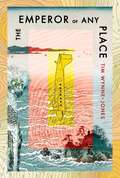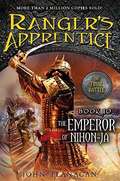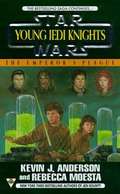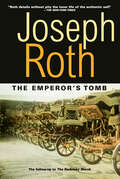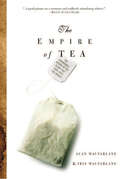- Table View
- List View
The Edge (An FBI Thriller #4)
by Catherine CoulterAn FBI agent's sister disappears after an attempted suicide. When Savich and Sherlock join the search, they discover a startling connection to a puzzling murder-and put their lives on the line to uncover the truth.
The Edge (An FBI Thriller #No. 4)
by Catherine CoulterAn FBI agent's sister disappears after an attempted suicide. When Savich and Sherlock join the search, they discover a startling connection to a puzzling murder-and put their lives on the line to uncover the truth.
The Edge (Penguin Readers #Level 6)
by Dick FrancisA high-class, transcontinental horse-racing junket should be an idyllic getaway for the super-rich.But one passenger on this train is a sociopath, a genius at blackmail and criminal corruption—and he plans to take everyone for everything they've got.
The Edge Becomes the Center: An Oral History of Gentrification in the Twenty-First Century
by DW GibsonThis “generous, vigorous, and enlightening look at class and space in New York” examines the human side of gentrification—“a joy to read” (The Paris Review).For years, journalists, policymakers, critics, and historians have tried to explain just what happens when new money and new residents flow into established neighborhoods. But now, “Mr. Gibson lets the city speak for itself, and it speaks with charm, swagger and heartening resilience” (The New York Times).The Edge Becomes the Center captures, in their own words, the stories of people?brokers, buyers, sellers, renters, landlords, artists, contractors, politicians, and everyone in between?who are shaping and being shaped by the new New York City.In this extraordinary oral history, Gibson shows us what urban change looks and feels like by exposing us to the voices of the people living through it. Drawing on the plainspoken, casually authoritative tradition of Jane Jacobs and Studs Terkel, The Edge Becomes the Center is an inviting and essential portrait of the way we live now.
The Edge of Anything
by Nora Shalaway CarpenterStarred Kirkus Review!A vibrant #ownvoices debut YA novel about grief, mental health, and the transformative power of friendship.Len is a loner teen photographer haunted by a past that's stagnated her work and left her terrified she's losing her mind. Sage is a high school volleyball star desperate to find a way around her sudden medical disqualification. Both girls need college scholarships. After a chance encounter, the two develop an unlikely friendship that enables them to begin facing their inner demons.But both Len and Sage are keeping secrets that, left hidden, could cost them everything, maybe even their lives.Set in the North Carolina mountains, this dynamic #ownvoices novel explores grief, mental health, and the transformative power of friendship.
The Edge of Falling: A Novel
by Rebecca SerleFrom the New York Times bestselling author of In Five Years comes a dark and seductive novel about the dangers of obsessive love.Caggie never wanted to be a hero, but some things are decided for us. Growing up among Manhattan&’s social elite, Caggie always had everything she could want, including a storied last name. But after saving a girl from the brink of suicide, Caggie becomes infamous, and now all she wants is to be left alone. After all, she&’s still reeling from the death of her younger sister last January, the subsequent destruction of her relationship with her high school boyfriend, Trevor, and the way in which her family has since fallen apart. So when mysterious Astor appears on the Upper East Side, he just might be the rescue she needs. But what is he hiding? As life as she knew it begins to unravel, Caggie realizes Astor&’s past may be as dark as her own. And in a world in which she&’s been branded a hero, Caggie will soon discover that no one can save you…not until you save yourself.
The Edge of Summer
by Erica GeorgeFans of Sarah Dessen and Morgan Matson will be swept away by this big-hearted novel about one girl navigating first loss and first love during a summer on Cape Cod. Saving the whales has been Coriander Cabot and her best friend Ella&’s dream since elementary school. But when tragedy strikes, Cor is left to complete the list of things they wanted to accomplish before college alone, including a marine biology internship on Cape Cod. Cor's summer of healing and new beginnings turns complicated when she meets Mannix, a local lifeguard who completely takes her breath away. But she knows whatever she has with Mannix might not last, and that her focus should be on rescuing the humpback whales from entanglement. As the tide changes, Cor finds herself distracted and struggling with her priorities. Can she follow her heart and keep her promise to the whales and her best friend?
The Edge of the Cloud (Flambards #2)
by K. M. PeytonChristina and her cousin Will have escaped their childhood home, Flambards, and gone to London to fulfill Will's ambition to design and pilot airplanes. Caught up in the events surrounding the onset of World War I, they discover that ambition doesn't equal success, and that the highs of one day can be followed by the depths of despair in the next. English rather than U.S. vocabulary, spelling and punctuation.
The Edifice Complex
by Deyan SudjicDeyan Sudjic's The Edifice Complex: The Architecture of Power is a fascinating exploration of the language of architecture as an insight into the psychology of power, from tyrants to billionaires. Why do presidents and prime ministers, tycoons and tyrants share such a fascination with grand designs? Is it to impress or terrify, to wield state power, make a bid for immortality or just satisfy their egos? From Hitler's vast Chancellery to Saddam Hussein's Mother of all Battles mosque, from Olympic stadiums to Donald Trump's excesses, Deyan Sudjic examines the murky relationship between buildings, money and politics, revealing the power of architecture - and the architecture of power. 'A thrilling and passionately indignant trawl through vanity's most polluted depths' The Times 'An often frightening, sometimes hilarious set of stories of brutality, absurdity and occasionally beauty' Evening Standar 'Punchily written . . . deftly amusing . . . a closely argued, brilliantly marshalled, important book' Daily Mail 'Informed, lively and intelligent . . . an asylum of power-mad politicians and Croesus-rich patrons' New Statesman 'By turns funny, acidic, penetrating and provocative . . . as compelling a read as a popular novel' Norman Foster Director of the Design Museum, Deyan Sudjic was born in London of Yugoslav parents. He is a former architecture critic for the Observer, and a visiting professor at the Royal College of Art. Sudjic was Director of the Venice Architecture Biennale in 2002 and is author of The Edifice Complex, the much-praised 100-Miles City, the best-selling Architecture Pack, The Language of Things and monographs on John Pawson, Ron Arad and Richard Rogers.
The Edifice Complex
by Deyan SudjicA provocative look at architecture-"exceptionally intelligent and original" (Jonathan Yardley, The Washington Post Book World) Deyan Sudjic-"probably the most influential figure in architecture you've never heard of" - argues that architecture, far from being auteur art, must be understood as a naked expression of power. From the grandiose projects of Stalin and Hitler to the "theme park" excess of today's presidential libraries, Sudjic goes behind the scenes of history's great manipulators of building propaganda-and exposes Rem Koolhaas, Frank Gehry, and other architects in a disturbing new light. This controversial book is essential reading for all those interested in the power of architecture-or the architecture of power. * A Washington Post Book World Best Book of the Year
The Effect of Living Backwards
by Heidi JulavitsDoes Alice really hate her sister, or is that love? Was she really enrolled in grad school, or was that an elaborate hoax? Is this really a hijacking, or is it merely the effect of living backwards? Following her acclaimed debut, The Mineral Palace, Heidi Julavits presents a quirky, compelling new novel about two sisters, a bizarre event, and the elusive nature of truth.
The Ego Tunnel: The Science of the Mind and the Myth of the Self
by Thomas MetzingerWe’re used to thinking about the self as an independent entity, something that we either have or are. InThe Ego Tunnel, philosopher Thomas Metzinger claims otherwise: No such thing as aselfexists. The conscious self is the content of a model created by our brain-an internal image, but one we cannot experienceasan image. Everything we experience is "a virtual self in a virtual reality. ” But if the self is not "real,” why and how did it evolve? How does the brain construct it? Do we still have souls, free will, personal autonomy, or moral accountability? In a time when the science of cognition is becoming as controversial as evolution,The Ego Tunnelprovides a stunningly original take on the mystery of the mind.
The Egyptians: A Radical History of Egypt's Unfinished Revolution
by Jack ShenkerThe award-winning journalist and longtime Cairo resident delivers a &“meticulous, passionate study&” of the ongoing battle for contemporary Egypt (The Guardian). On January, 25, 2011, a revolution began in Egypt that succeeded in ousting the country&’s longtime dictator Hosni Mubarak. In The Egyptians, journalist Jack Shenker uncovers the roots of the uprising and explores the country&’s current state, divided between two irreconcilable political orders. Challenging conventional analyses that depict a battle between Islamists and secular forces, The Egyptians illuminates other, equally important fault lines: far-flung communities waging war against transnational corporations, men and women fighting to subvert long-established gender norms, and workers dramatically seizing control of their own factories. Putting the Egyptian revolution in its proper context as an ongoing popular struggle against state authority and economic exclusion, The Egyptians explains why the events since 2011 have proved so threatening to elites both inside Egypt and abroad. As Egypt&’s rulers seek to eliminate all forms of dissent, seeded within the rebellious politics of Egypt&’s young generation are big ideas about democracy, sovereignty, social justice, and resistance that could yet change the world. &“I started reading this and couldn&’t stop. It&’s a remarkable piece of work, and very revealing. A stirring rendition of a people&’s revolution as the popular forces that Shenker vividly depicts carry forward their many and varied struggles, with radical potential that extends far beyond Egypt.&” —Noam Chomsky
The Electric War: Edison, Tesla, Westinghouse, and the Race to Light the World
by Mike WinchellThe spellbinding true account of the scientific competition to light the world with electricity.In the mid-to-late-nineteenth century, a burgeoning science called electricity promised to shine new light on a rousing nation. Inventive and ambitious minds were hard at work. Soon that spark was fanned, and a fiery war was under way to be the first to light—and run—the world with electricity. Thomas Alva Edison, the inventor of direct current (DC), engaged in a brutal battle with Nikola Tesla and George Westinghouse, the inventors of alternating current (AC). There would be no ties in this race—only a winner and a loser. The prize: a nationwide monopoly in electric current. Brimming with action, suspense, and rich historical and biographical information about these brilliant inventors, here is the rousing account of one of the world’s defining scientific competitions. Christy Ottaviano Books
The Elegance of the Hedgehog
by Muriel BarberyThe phenomenal New York Times bestseller that “explores the upstairs-downstairs goings-on of a posh Parisian apartment building” (Publishers Weekly).In an elegant hôtel particulier in Paris, Renée, the concierge, is all but invisible—short, plump, middle-aged, with bunions on her feet and an addiction to television soaps. Her only genuine attachment is to her cat, Leo. In short, she’s everything society expects from a concierge at a bourgeois building in an upscale neighborhood. But Renée has a secret: She furtively, ferociously devours art, philosophy, music, and Japanese culture. With biting humor, she scrutinizes the lives of the tenants—her inferiors in every way except that of material wealth.Paloma is a twelve-year-old who lives on the fifth floor. Talented and precocious, she’s come to terms with life’s seeming futility and decided to end her own on her thirteenth birthday. Until then, she will continue hiding her extraordinary intelligence behind a mask of mediocrity, acting the part of an average pre-teen high on pop culture, a good but not outstanding student, an obedient if obstinate daughter.Paloma and Renée hide their true talents and finest qualities from a world they believe cannot or will not appreciate them. But after a wealthy Japanese man named Ozu arrives in the building, they will begin to recognize each other as kindred souls, in a novel that exalts the quiet victories of the inconspicuous among us, and “teaches philosophical lessons by shrewdly exposing rich secret lives hidden beneath conventional exteriors” (Kirkus Reviews).“The narrators’ kinetic minds and engaging voices (in Alison Anderson’s fluent translation) propel us ahead.” —The New York Times Book Review“Barbery’s sly wit . . . bestows lightness on the most ponderous cogitations.” —The New Yorker
The Elephant Mountains
by Scott ElyAn unprecedented series of hurricanes has swollen the Mississippi River to unheard-of levels and is threatening to put New Orleans and most of the low-lying areas of the South under water. Fifteen-year-old Stephen is spending the summer with his father near a small town north of Lake Pontchartrain when another powerful hurricane arrives and the levees on the Mississippi River completely fail. In the anarchy and chaos that results, Stephen's father is killed, and the boy is left to fend for himself. Stephen soon encounters Angela, a college student whose parents have also been killed. Navigating the labyrinth of flooded fields and towns in an airboat, the two set out in search of Stephen's mother and higher ground.
The Eleventh Plague
by Jeff HirschIn an America devastated by war and plague, the only way to survive is to keep moving.In the aftermath of a war, America's landscape has been ravaged and two-thirds of the population left dead from a vicious strain of influenza. Fifteen-year-old Stephen Quinn and his family were among the few that survived and became salvagers, roaming the country in search of material to trade. But when Stephen's grandfather dies and his father falls into a coma after an accident, Stephen finds his way to Settler's Landing, a community that seems too good to be true. Then Stephen meets strong, defiant, mischievous Jenny, who refuses to accept things as they are. And when they play a prank that goes horribly wrong, chaos erupts, and they find themselves in the midst of a battle that will change Settler's Landing--and their lives--forever.
The Ellimist Chronicles
by K. A. ApplegateThe story of the Ellimist, who lived billions of years and talks about his youth on an alien homeworld, his relationships with characters who play an important role in his life, his triumph and despair, his losses and learnings.
The Ember Blade (The\darkwater Legacy Ser.)
by Chris WoodingA land under occupation. A legendary sword. A young man's journey to find his destiny.Aren has lived by the rules all his life. He's never questioned it; that's just the way things are. But then his father is executed for treason, and he and his best friend Cade are thrown into a prison mine, doomed to work until they drop. Unless they can somehow break free . . .But what lies beyond the prison walls is more terrifying still. Rescued by a man who hates him yet is oath-bound to protect him, pursued by inhuman forces, Aren slowly accepts that everything he knew about his world was a lie. The rules are not there to protect him, or his people, but to enslave them. A revolution is brewing, and Aren is being drawn into it, whether he likes it or not.The key to the revolution is the Ember Blade. The sword of kings, the Excalibur of his people. Only with the Ember Blade in hand can their people be inspired to rise up . . . but it's locked in an impenetrable vault in the most heavily guarded fortress in the land.All they have to do now is steal it . . .
The Emergency State: America's Pursuit of Absolute Security at All Costs
by David C. UngerEditor's Choice, NEW YORK TIMES BOOK REVIEW"Ambitious and valuable" --WASHINGTON POSTAmerica is trapped in a state of war that has consumed our national life since before Pearl Harbor. Over seven decades and several bloody wars, Democratic and Republican politicians alike have assembled an increasing complicated--and increasingly ineffective--network of security services. Trillions of tax dollars have been diverted from essential domestic needs while the Pentagon created a worldwide web of military bases, inventing new American security interests where none previously existed. Yet this pursuit has not only damaged our democratic institutions and undermined our economic strength--it has fundamentally failed to make us safer.In The Emergency State, senior New York Times journalist David C. Unger reveals the hidden costs of America's obsessive pursuit of absolute national security, showing how this narrow-minded emphasis on security came to distort our political life. Unger reminds us that in the first 150 years of the American republic the U.S. valued limited military intervention abroad, along with the checks and balances put in place by the founding fathers. Yet American history took a sharp turn during and just after World War II, when we began building a vast and cumbersome complex of national security institutions and beliefs. Originally designed to wage hot war against Germany and cold war against the Soviet Union, our security bureaucracy has become remarkably ineffective at confronting the elusive, non-state sponsored threats we now face.The Emergency State traces a series of missed opportunities--from the end of World War II to the election of Barack Obama--when we could have paused to rethink our defense strategy and didn't. We have ultimately failed to dismantle our outdated national security state because both parties are equally responsible for its expansion. While countless books have exposed the damage wrought by George W. Bush's "war on terror," Unger shows it was only the natural culmination of decades of bipartisan emergency state logic--and argues that Obama, along with many previous Democratic presidents, has failed to shift course in any meaningful way.The Emergency State: America's Pursuit of Absolute Security At All Costs reveals the depth of folly into which we've fallen, as Americans eagerly trade away the country's greatest strengths for a fleeting illusion of safety. Provocative, insightful, and refreshingly nonpartisan, The Emergency State is the definitive untold story of how America became this vulnerable--and how it can build true security again.
The Emperor of Any Place
by Tim Wynne-JonesThe ghosts of war reverberate across the generations in a riveting, time-shifting story within a story from acclaimed thriller writer Tim Wynne-Jones. <P><P> <p>When Evan's father dies suddenly, Evan finds a hand-bound yellow book on his desk--a book his dad had been reading when he passed away. <p>The book is the diary of a Japanese soldier stranded on a small Pacific island in WWII. <p>Why was his father reading it? What is in this account that Evan's grandfather, whom Evan has never met before, fears so much that he will do anything to prevent its being seen? And what could this possibly mean for Evan? <p>In a pulse-quickening mystery evoking the elusiveness of truth and the endurance of wars passed from father to son, this engrossing novel is a suspenseful, at times terrifying read from award-winning author Tim Wynne-Jones.
The Emperor of Nihon-Ja (Ranger's Apprentice #10)
by John FlanaganThe international bestselling series with over 5 million copies sold in the U.S. alone! <P> When Horace travels to the exotic land of Nihon- Ja, it isn't long before he finds himself pulled into a battle that is not his - but one he knows in his heart he must wage. A kingdom teeters on the edge of chaos when the Nihon-Ja emperor, a defender of the common man, is forcibly overthrown, and only Horace, Will, and his Araluen companions can restore the emperor to the throne. Victory lies in the hands of an inexperienced group of fighters, and it's anybody's guess who will make the journey home to Araluen.<P> Perfect for fans of J.R.R. Tolkien's Lord of the Rings, T.H. White's The Sword in the Stone, Christopher Paolini's Eragon series, and George R. R. Martin's Game of Thrones/A Song of Ice and Fire series.
The Emperor's Plague (Star Wars: Young Jedi Knights)
by Kevin J. Anderson Rebecca MoestaIt's a race against time to find and destroy the Emperor's Plague before it can be released. But first the young Jedi knights must face Nolaa Tarkona and her very lethal hired hand Boba Fett. This is book 11 in the Young Jedi Knights series
The Emperor's Tomb
by Joseph Roth John HoareThe Emperor's Tomb is a nostalgic, haunting elegy for the end of youth and the last days of the Austro-Hungarian Empire. A continuation of the saga of the von Trotta family from The Radetzky March, it is both a powerful and moving look at a decaying society and its journey through the War and its devastating aftermath, and the story of the erosion of one man's desperate faith in the virtues of a simple life.
The Empire of Tea
by Alan Macfarlane Iris MacFarlaneThis cultural, political, and social history of tea presents a &“fascinating picture of tea's impact on the lives of millions of people around the world.&” (Publishers Weekly) From Darjeeling to Lapsang Souchon, from India to Japan—a fresh, concise, world-encompassing exploration of the way tea has shaped politics, culture, and the environment throughout history. From the fourth century BC in China, where it was used as an aid in Buddhist meditation, to the Boston Tea Party in 1773, to its present-day role as the most consumed substance on the planet, the humble Camellia plant has had profound effects on civilization. Renowned cultural anthropologist Alan MacFarlane and Iris MacFarlane recount the history of tea from its origin in the eastern Himalayas and explains, among other things, how tea became the world's most prevalent addiction, how tea was used as an instrument of imperial control, and how the cultivation of tea drove the industrial revolution. Both an absorbing narrative and a fascinating tour of some of the world's great cultures—Japan, China, India, France, Britain, and others—The Empire of Tea brings into sharp focus one of the forces that shaped history. "A good primer on a resonant and endlessly stimulating subject.&” —Boston Sunday Globe &“A fascinating picture of tea's impact on the lives of millions of people around the world.&” —Publishers Weekly &“An absorbing read.&” —Kirkus Reviews
